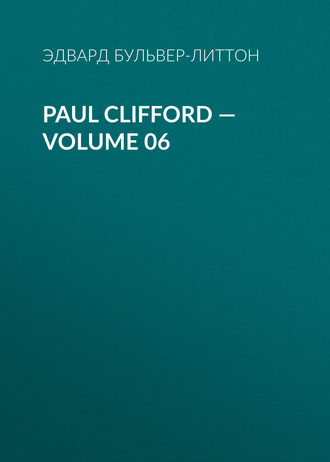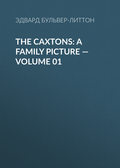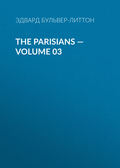
Эдвард Бульвер-Литтон
Paul Clifford — Volume 06
"You do not say so!" rejoined Brandon, apathetically, as he slowly gathered his papers together and deposited them in a drawer.
"Indeed it is true; and what is more, Brandon, this fellow is one of the very identical highwaymen who robbed me on my road from Bath. No doubt he did me the same kind office on my road to Mauleverer Park."
"Possibly," said Brandon, who appeared absorbed in a revery.
"Ay!" answered Mauleverer, piqued at this indifference. "But do you not see the consequences to your niece?"
"My niece!" repeated Brandon, rousing himself.
"Certainly. I grieve to say it, my dear friend,—but she was young, very young, when at Bath. She suffered this fellow to address her too openly. Nay,—for I will be frank,—she was suspected of being in love with him!"
"She was in love with him," said Brandon, dryly, and fixing the malignant coldness of his eye upon the suitor. "And, for aught I know," added he, "she is so at this moment."
"You are cruel!" said Mauleverer, disconcerted. "I trust not, for the sake of my continued addresses."
"My dear lord," said Brandon, urbanely taking the courtier's hand, while the anguis in herba of his sneer played around his compressed lips,— "my dear lord, we are old friends, and need not deceive each other. You wish to marry my niece because she is an heiress of great fortune, and you suppose that my wealth will in all probability swell her own. Moreover, she is more beautiful than any other young lady of your acquaintance, and, polished by your example, may do honour to your taste as well as your prudence. Under these circumstances, you will, I am quite sure, look with lenity on her girlish errors, and not love her the less because her foolish fancy persuades her that she is in love with another."
"Ahem!" said Mauleverer, "you view the matter with more sense than sentiment; but look you, Brandon, we must try, for both our sakes, if possible, to keep the identity of Lovett with Clifford from being known. I do not see why it should be. No doubt he was on his guard while playing the gallant, and committed no atrocity at Bath. The name of Clifford is hitherto perfectly unsullied. No fraud, no violence are attached to the appellation; and if the rogue will but keep his own counsel, we may hang him out of the way without the secret transpiring."
"But if I remember right," said Brandon, "the newspapers say that this Lovett will be tried some seventy or eighty miles only from Bath, and that gives a chance of recognition."
"Ay, but he will be devilishly altered, I imagine; for his wound has already been but a bad beautifier to his face. Moreover, if the dog has any delicacy, he will naturally dislike to be known as the gallant of that gay city where he shone so successfully, and will disguise himself as well as he is able. I hear wonders of his powers of self- transformation."
"But he may commit himself on the point between this and his trial," said Brandon.
"I think of ascertaining how far that is likely, by sending my valet down to him (you know one treats these gentlemen highwaymen with a certain consideration, and hangs them with all due respect to their feelings), to hint that it will be doubtless very unpleasant to him, under his 'present unfortunate circumstances' (is not that the phrase?), to be known as the gentleman who enjoyed so deserved a popularity at Bath, and that, though 'the laws of my country compel me' to prosecute him, yet, should he desire it, he may be certain that I will preserve his secret. Come, Brandon, what say you to that manoeuvre? It will answer my purpose, and make the gentleman—for doubtless he is all sensibility—shed tears at my generous forbearance!"
"It is no bad idea," said Brandon. "I commend you for it. At all events, it is necessary that my niece should not know the situation of her lover. She is a girl of a singular turn of mind, and fortune has made her independent. Who knows but that she might commit some folly or another, write petitions to the king, and beg me to present them, or go— for she has a world of romance in her—to prison, to console him; or, at all events, she would beg my kind offices on his behalf,—a request peculiarly awkward, as in all probability I shall have the honour of trying him."
"Ay, by the by, so you will. And I fancy the poor rogue's audacity will not cause you to be less severe than you usually are. They say you promise to make more human pendulums than any of your brethren."
"They do say that, do they?" said Brandon. "Well, I own I have a bile against my species; I loathe their folly and their half vices. 'Ridet et odit'—["He laughs and hates"]—is my motto; and I allow that it is not the philosophy that makes men merciful!"
"Well, Juvenal's wisdom be yours, mine be Horace's!" rejoined Mauleverer, as he picked his teeth; "but I am glad you see the absolute necessity of keeping this secret from Lucy's suspicion. She never reads the papers, I suppose? Girls never do!"
"No! and I will take care not to have them thrown in her way; and as, in consequence of my poor brother's recent death, she sees nobody but us, there is little chance, should Lovett's right to the name of Clifford be discovered, that it should reach her ears."
"But those confounded servants?"
"True enough! But consider that before they know it, the newspapers will; so that, should it be needful, we shall have our own time to caution them. I need only say to Lucy's woman, 'A poor gentleman, a friend of the late squire, whom your mistress used to dance with, and you must have seen,—Captain Clifford,—is to be tried for his life. It will shock her, poor thing! in her present state of health, to tell her of so sad an event to her father's friend; therefore be silent, as you value your place and ten guineas,'—and I may be tolerably sure of caution!"
"You ought to be chairman to the Ways and Means Committee!" cried Mauleverer. "My mind is now easy; and when once poor Clifford is gone,— fallen from a high estate,—we may break the matter gently to her; and as I intend thereon to be very respectful, very delicate, etc., she cannot but be sensible of my kindness and real affection!"
"And if a live dog be better than a dead lion," added Brandon, "surely a lord in existence will be better than a highwayman hanged!"
"According to ordinary logic," rejoined Mauleverer, "that syllogism is clear enough; and though I believe a girl may cling now and then to the memory of a departed lover, I do not think she will when the memory is allied with shame. Love is nothing more than vanity pleased; wound the vanity, and you destroy the love! Lucy will be forced, after having made so bad a choice of a lover, to make a good one in a husband, in order to recover her self-esteem!"
"And therefore you are certain of her!" said Brandon, ironically.
"Thanks to my star,—my garter,—my ancestor, the first baron, and myself, the first earl,—I hope I am," said Mauleverer; and the conversation turned. Mauleverer did not stay much longer with the judge; and Brandon, left alone, recurred once more to the, perusal of his letters.
We scarcely know what sensations it would have occasioned in one who had known Brandon only in his later years, could he have read those letters referring to so much earlier a date. There was in the keen and arid character of the man so little that recalled any idea of courtship or youthful gallantry that a correspondence of that nature would have appeared almost as unnatural as the loves of plants, or the amatory softenings of a mineral. The correspondence now before Brandon was descriptive of various feelings, but all appertaining to the same class; most of them were apparent answers to letters from him. One while they replied tenderly to expressions of tenderness, but intimated a doubt whether the writer would be able to constitute his future happiness, and atone for certain sacrifices of birth and fortune and ambitious prospects, to which she alluded: at other times, a vein of latent coquetry seemed to pervade the style,—an indescribable air of coolness and reserve contrasted former passages in the correspondence, and was calculated to convey to the reader an impression that the feelings of the lover were not altogether adequately returned. Frequently the writer, as if Brandon had expressed himself sensible of this conviction, reproached him for unjust jealousy and unworthy suspicion. And the tone of the reproach varied in each letter; sometimes it was gay and satirizing; at others soft and expostulatory; at others gravely reasoning, and often haughtily indignant. Still, throughout the whole correspondence, on the part of the mistress, there was a sufficient stamp of individuality to give a shrewd examiner some probable guess at the writer's character. He would have judged her, perhaps, capable of strong and ardent feeling, but ordinarily of a light and capricious turn, and seemingly prope to imagine and to resent offence. With these letters were mingled others in Brandon's writing,—of how different, of how impassioned a description! All that a deep, proud, meditative, exacting character could dream of love given, or require of love returned, was poured burningly over the pages; yet they were full of reproach, of jealousy, of a nice and torturing observation, as calculated to wound as the ardour might be fitted to charm; and often the bitter tendency to disdain that distinguished his temperament broke through the fondest enthusiasm of courtship or the softest outpourings of love.
"You saw me not yesterday," he wrote in one letter, "but I saw you; all day I was by you: you gave not a look which passed me unnoticed; you made not a movement which I did not chronicle in my memory. Julia, do you tremble when I tell you this? Yes, if you have a heart, I know these words would stab it to the core! You may affect to answer me indignantly! Wise dissembler! it is very skilful, very, to assume anger when you have no reply. I repeat during the whole of that party of pleasure (pleasure! well, your tastes, it must be acknowledged, are exquisite!) which you enjoyed yesterday, and which you so faintly asked me to share, my eye was on you. You did not know that I was in the wood when you took the grin of the incomparable Digby, with so pretty a semblance of alarm at the moment the snake which my foot disturbed glided across your path. You did not know I was within hearing of the tent where you made so agreeable a repast, and from which your laughter sent peals so many and so numerous. Laughter! O Julia, can you tell me that you love, and yet be happy, even to mirth, when I am away! Love! O God, how different a sensation is mine! Mine makes my whole principle of life! Yours! I tell you that I think at moments I would rather have your hate than the lukewarm sentiment you bear to me, and honour by the name of affection.' Pretty phrase! I have no affection for you! Give me not that sickly word; but try with me, Julia, to invent some expression that has never filtered a paltry meaning through the lips of another! Affection! why, that is a sister's word, a girl's word to her pet squirrel! Never was it made for that ruby and most ripe mouth! Shall I come to your house this evening? Your mother has asked me, and you—you heard her, and said nothing. Oh! but that was maiden reserve, was it? and maiden reserve caused you to take up a book the moment I left you, as if my company made but an ordinary amusement instantly to be replaced by another! When I have seen you, society, books, food, all are hateful to me; but you, sweet Julia, you can read, can you? Why, when I left you, I lingered by the parlour window for hours, till dusk, and you never once lifted your eyes, nor saw me pass and repass. At least I thought you would have watched my steps when I left the house; but I err, charming moralist! According to you, that vigilance would have been meanness."
In another part of the correspondence a more grave if not a deeper gush of feeling struggled for expression.
"You say, Julia, that were you to marry one who thinks so much of what he surrenders for you, and who requires from yourself so vast a return of love, you should tremble for the future happiness of both of us. Julia, the triteness of that fear proves that you love not at all. I do not tremble for our future happiness; on the contrary, the intensity of my passion for you makes me know that we never can be happy, never beyond the first rapture of our union. Happiness is a quiet and tranquil feeling. No feeling that I can possibly bear to you will ever receive those epithets,—I know that I shall be wretched and accursed when I am united to you. Start not! I will presently tell you why. But I do not dream of happiness, neither (could you fathom one drop of the dark and limitless ocean of my emotions) would you name to me that word. It is not the mercantile and callous calculation of chances for 'future felicity' (what homily supplied you with so choice a term?) that enters into the heart that cherishes an all-pervading love. Passion looks only to one object, to nothing beyond; I thirst, I consume, not for happiness, but you. Were your possession inevitably to lead me to a gulf of anguish and shame, think you I should covet it one jot the less! If you carry one thought, one hope, one dim fancy, beyond the event that makes you mine, you may be more worthy of the esteem of others, but you are utterly undeserving of my love.
. . . . . . . . . . . . . . . .
"I will tell you now why I know we cannot be happy. In the first place, when you say that I am proud of birth, that I am morbidly ambitious, that I am anxious to shine in the great world, and that after the first intoxication of love has passed away I shall feel bitterness against one who has so humbled my pride and darkened my prospects, I am not sure that you wholly err. But I am sure that the instant remedy is in your power. Have you patience, Julia, to listen to a kind Of history of myself, or rather of my feelings? If so, perhaps it may be the best method of explaining all that I would convey. You will see, then, that my family pride and my worldly ambition are not founded altogether on those basements which move my laughter in another; if my feelings thereon are really, however, as you would insinuate, equal matter for derision, behold, my Julia, I can laugh equally at them! So pleasant a thing to me is scorn, that I would rather despise myself than have no one to despise! But to my narrative! You must know that there are but two of us, sons of a country squire, of old family, which once possessed large possessions and something of historical renown. We lived in an old country-place; my father was a convivial dog, a fox-hunter, a drunkard, yet in his way a fine gentleman,—and a very disreputable member of society. The first feelings towards him that I can remember were those of shame. Not much matter of family pride here, you will say! True, and that is exactly the reason which made me cherish family pride elsewhere. My father's house was filled with guests,—some high and some low; they all united in ridicule of the host. I soon detected the laughter, and you may imagine that it did not please me. Meanwhile the old huntsman, whose family was about as ancient as ours, and whose ancestors had officiated in his capacity for the ancestors of his master time out of mind, told me story after story about the Brandons of yore. I turned from the stories to more legitimate history, and found the legends were tolerably true. I learned to glow at this discovery; the pride, humbled when I remembered my sire, revived when I remembered my ancestors. I became resolved to emulate them, to restore a sunken name, and vowed a world of nonsense on the subject. The habit of brooding over these ideas grew on me. I never heard a jest broken on my paternal guardian, I never caught the maudlin look of his reeling eyes, nor listened to some exquisite inanity from his besotted lips, but that my thoughts flew instantly back to the Sir Charleses and the Sir Roberts of my race, and I comforted myself with the hope that the present degeneracy should pass away. Hence, Julia, my family pride; hence, too, another feeling you dislike in me,—disdain! I first learned to despise my father, the host, and I then despised my acquaintances, his guests; for I saw, while they laughed at him, that they flattered, and that their merriment was not the only thing suffered to feed at his expense. Thus contempt grew up with me, and I had nothing to check it; for when I looked around I saw not one living thing that I could respect. This father of mine had the sense to think I was no idiot. He was proud (poor man!) of 'my talents,' namely, of prizes won at school, and congratulatory letters from my masters. He sent me to college. My mind took a leap there; I will tell you, prettiest, what it was! Before I went thither I had some fine vague visions about virtue. I thought to revive my ancestral honours by being good; in short, I was an embryo King Pepin. I awoke from this dream at the University. There, for the first time, I perceived the real consequence of rank.
"At school, you know, Julia, boys care nothing for a lord. A good cricketer, an excellent fellow, is worth all the earls in the peerage. But at college all that ceases; bats and balls sink into the nothingness in which corals and bells had sunk before. One grows manly, and worships coronets and carriages. I saw it was a fine thing to get a prize, but it was ten times a finer thing to get drunk with a peer. So, when I had done the first, my resolve to be worthy of my sires made me do the second,—not, indeed, exactly; I never got drunk: my father disgusted me with that vice betimes. To his gluttony I owe my vegetable diet, and to his inebriety my addiction to water. No, I did not get drunk with peers; but I was just as agreeable to them as if I had been equally embruted. I knew intimately all the 'Hats' in the University, and I was henceforth looked up to by the 'Caps,' as if my head had gained the height of every hat that I knew.
[At Cambridge the sons of noblemen and the eldest sons of baronets are allowed to wear hats instead of the academical cap.]
But I did not do this immediately. I must tell you two little anecdotes that first initiated me into the secret of real greatness.
"The first was this: I was sitting at dinner with some fellows of a college, grave men and clever. Two of them, not knowing me, were conversing about me; they heard, they said, that I should never be so good a fellow as my father,—have such a cellar or keep such a house. 'I have met six earls there and a marquess,' quoth the other senior. 'And his son,' returned the first don, 'only keeps company with sizars, I believe.' 'So then,' said I to myself, 'to deserve the praise even of clever men, one must have good wines, know plenty of earls, and for swear sizars.' Nothing could be truer than my conclusion.
"Anecdote the second is this: On the day I gained a high university prize I invited my friends to dine with me. Four of them refused because they were engaged (they had been asked since I asked them), —to whom? the richest man at the University. These occurrences, happening at the same time, threw me into a profound revery. I awoke, and became a man of the world. I no longer resolved to be virtuous, and to hunt after the glory of your Romans and your Athenians,—I resolved to become rich, powerful, and of worldly repute.
"I abjured my honest sizars, and as I said before, I courted some rich 'Hats.' Behold my first grand step in the world! I became the parasite and the flatterer. What! would my pride suffer this? Verily, yes, my pride delighted in it; for it soothed my spirit of contempt to put these fine fellows to my use! It soothed me to see how easily I could cajole them, and to what a variety of purposes I could apply even the wearisome disgust of their acquaintance. Nothing is so foolish as to say the idle great are of no use; they can be put to any use whatsoever that a wise man is inclined to make of them. Well, Julia, lo! my character already formed; the family pride, disdain, and worldly ambition,—there it is for you. After circumstances only strengthened the impression already made. I desired, on leaving college, to go abroad; my father had no money to give me. What signified that? I looked carelessly around for some wealthier convenience than the paternal board; I found it in a Lord Mauleverer. He had been at college with me, and I endured him easily as a companion,—for he had accomplishments, wit, and good- nature. I made him wish to go abroad, and I made him think he should die of ennui if I did not accompany him. To his request to that effect I reluctantly agreed, and saw everything in Europe, which he neglected to see, at his expense. What amused me the most was the perception that I, the parasite, was respected by him; and he, the patron, was ridiculed by me! It would not have been so if I had depended on 'my virtue.' Well, sweetest Julia, the world, as I have said, gave to my college experience a sacred authority. I returned to England; and my father died, leaving to me not a sixpence, and to my brother an estate so mortgaged that he could not enjoy it, and so restricted that he could not sell it. It was now the time for me to profit by the experience I boasted of. I saw that it was necessary I should take some profession. Professions are the masks to your pauper-rogue; they give respectability to cheating, and a diploma to feed upon others. I analyzed my talents, and looked to the customs of my country; the result was my resolution to take to the Bar. I had an inexhaustible power of application; I was keen, shrewd, and audacious. All these qualities 'tell' at the courts of justice. I kept my legitimate number of terms; I was called; I went the circuit; I obtained not a brief,— not a brief, Julia! My health, never robust, gave way beneath study and irritation. I was ordered to betake myself to the country. I came to this village, as one both salubrious and obscure. I lodged in the house of your aunt; you came hither daily,—I saw you,—you know the rest. But where, all this time, were my noble friends? you will say. 'Sdeath, since we had left college, they had learned a little of the wisdom I had then possessed; they were not disposed to give something for nothing; they had younger brothers, and cousins, and mistresses, and, for aught I know, children to provide for. Besides, they had their own expenses; the richer a man is, the less he has to give. One of them would have bestowed on me a living, if I had gone into the Church; another, a commission if I had joined his regiment. But I knew the day was past both for priest and soldier; and it was not merely to live, no, nor to live comfortably, but to enjoy power, that I desired; so I declined these offers. Others of my friends would have been delighted to have kept me in their house, feasted me, joked with me, rode with me, nothing more! But I had already the sense to see that if a man dances himself into distinction, it is never by the steps of attendance. One must receive favours and court patronage, but it must be with the air of an independent man. My old friends thus rendered useless, my legal studies forbade me to make new, nay, they even estranged me from the old; for people may say what they please about a similarity of opinions being necessary to friendship,—a similarity of habits is much more so. It is the man you dine, breakfast, and lodge with, walk, ride, gamble, or thieve with, that is your friend; not the man who likes Virgil as well as you do, and agrees with you in an admiration of Handel. Meanwhile my chief prey, Lord Mauleverer, was gone; he had taken another man's Dulcinea, and sought out a bower in Italy. From that time to this I have never heard of him nor seen him; I know not even his address. With the exception of a few stray gleanings from my brother, who, good easy man! I could plunder more, were I not resolved not to ruin the family stock, I have been thrown on myself; the result is that, though as clever as my fellows, I have narrowly shunned starvation,—had my wants been less simple, there would have been no shunning in the case; but a man is not easily starved who drinks water, and eats by the ounce. A more effectual fate might have befallen me. Disappointment, wrath, baffled hope, mortified pride, all these, which gnawed at my heart, might have consumed it long ago; I might have fretted away as a garment which the moth eateth, had it not been for that fund of obstinate and iron hardness which nature—I beg pardon, there is no nature—circumstance bestowed upon me. This has borne me up, and will bear me yet through time and shame and bodily weakness and mental fever, until my ambition has won a certain height, and my disdain of human pettiness rioted in the external sources of fortune, as well as an inward fountain of bitter and self-fed consolation. Yet, oh, Julia! I know not if even this would have supported me, if at that epoch of life, when I was most wounded, most stricken in body, most soured in mind, my heart had not met and fastened itself to yours. I saw you, loved you; and life became to me a new object. Even now, as I write to you, all my bitterness, my pride, vanish; everything I have longed for disappears; my very ambition is gone. I have no hope but for you, Julia; beautiful, adored Julia! when I love you, I love even my kind. Oh, you know not the power you possess over me! Do not betray it; you can yet make me all that my boyhood once dreamed, or you can harden every thought, feeling, sensation, into stone.
. . . . . . . . . . . . . . . .
"I was to tell you why I look not for happiness in our union. You have now seen my nature. You have traced the history of my life, by tracing the history of my character. You see what I surrender in gaining you. I do not deny the sacrifice. I surrender the very essentials of my present mind and soul. I cease to be worldly. I cannot raise myself, I cannot revive my ancestral name; nay, I shall relinquish it forever. I shall adopt a disguised appellation. I shall sink into another grade of life. In some remote village, by means of some humbler profession than that I now follow, we must earn our subsistence, and smile at ambition. I tell you frankly, Julia, when I close the eyes of my heart, when I shut you from my gaze, this sacrifice appalls me. But even then you force yourself before me, and I feel that one glance from your eye is more to me than all. If you could bear with me,—if you could soothe me,—if when a cloud is on me you could suffer it to pass away unnoticed, and smile on me the moment it is gone,—O Julia! there would be then no extreme of poverty, no abasement of fortune, no abandonment of early dreams which would not seem to me rapture if coupled with the bliss of knowing that you are mine. Never should my lip, never should my eye tell you that there is that thing on earth for which I repine or which I could desire. No, Julia, could I flatter my heart with this hope, you would not find me dream of unhappiness and you united. But I tremble, Julia, when I think of your temper and my own; you will conceive a gloomy look from one never mirthful is an insult, and you will feel every vent of passion on Fortune or on others as a reproach to you. Then, too, you cannot enter into my nature; you cannot descend into its caverns; you cannot behold, much less can you deign to lull, the exacting and lynx-eyed jealousy that dwells there. Sweetest Julia! every breath of yours, every touch of yours, every look of yours, I yearn for beyond all a mother's longing for the child that has been torn from her for years. Your head leaned upon an old tree (do you remember it, near ———?), and I went every day, after seeing you, to kiss it. Do you wonder that I am jealous? How can I love you as I do and be otherwise! My whole being is intoxicated with you!
. . . . . . . . . . . . . . . .
"This then, your pride and mine, your pleasure in the admiration of others, your lightness, Julia, make me foresee an eternal and gushing source of torture to my mind. I care not; I care for nothing so that you are mine, if but for one hour."
It seems that, despite the strange, sometimes the unloverlike and fiercely selfish nature of these letters from Brandon, something of a genuine tone of passion,—perhaps their originality,—aided, no doubt, by some uttered eloquence of the writer and some treacherous inclination on the part of the mistress, ultimately conquered; and that a union so little likely to receive the smile of a prosperous star was at length concluded. The letter which terminated the correspondence was from Brandon: it was written on the evening before the marriage, which, it appeared by the same letter, was to be private and concealed. After a, rapturous burst of hope and joy, it continued thus:—
"Yes, Julia, I recant my words; I have no belief that you or I shall ever have cause hereafter for unhappiness. Those eyes that dwelt so tenderly on mine; that hand whose pressure lingers yet in every nerve of my frame; those lips turned so coyly, yet, shall I say, reluctantly from me,—all tell me that you love me; and my fears are banished. Love, which conquered my nature, will conquer the only thing I would desire to see altered in yours. Nothing could ever make me adore you less, though you affect to dread it,—nothing but a knowledge that you are unworthy of me, that you have a thought for another; then I should not hate you. No; the privilege of my past existence would revive; I should revel in a luxury of contempt, I should despise you, I should mock you, and I should be once more what I was before I knew you. But why do I talk thus? My bride, my blessing, forgive me!"
In concluding our extracts from this correspondence, we wish the reader to note, first, that the love professed by Brandon seems of that vehement and corporeal nature which, while it is often the least durable, is often the most susceptible of the fiercest extremes of hatred or even of disgust; secondly, that the character opened by this sarcastic candour evidently required in a mistress either an utter devotion or a skilful address; and thirdly, that we have hinted at such qualities in the fair correspondent as did not seem sanguinely to promise either of these essentials.







